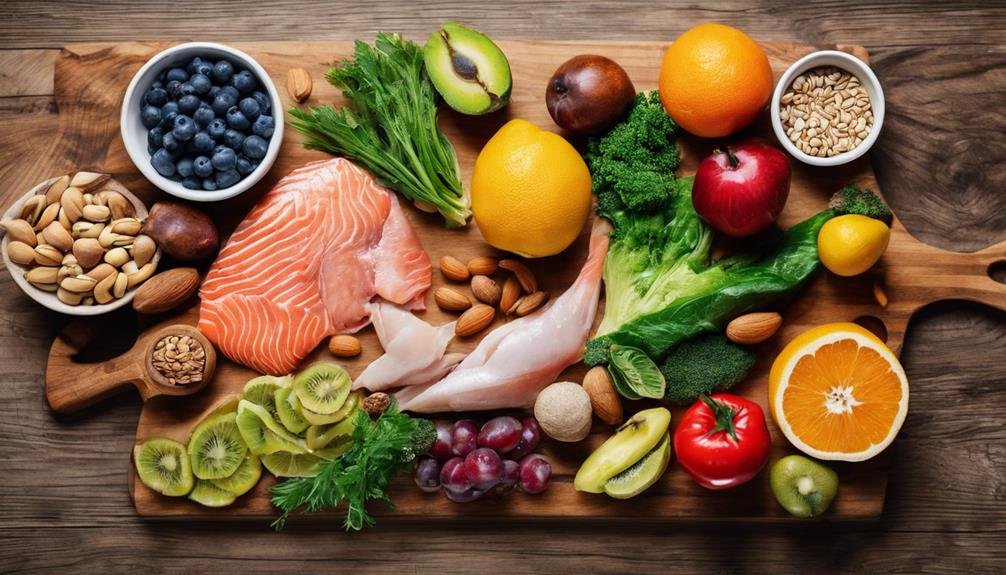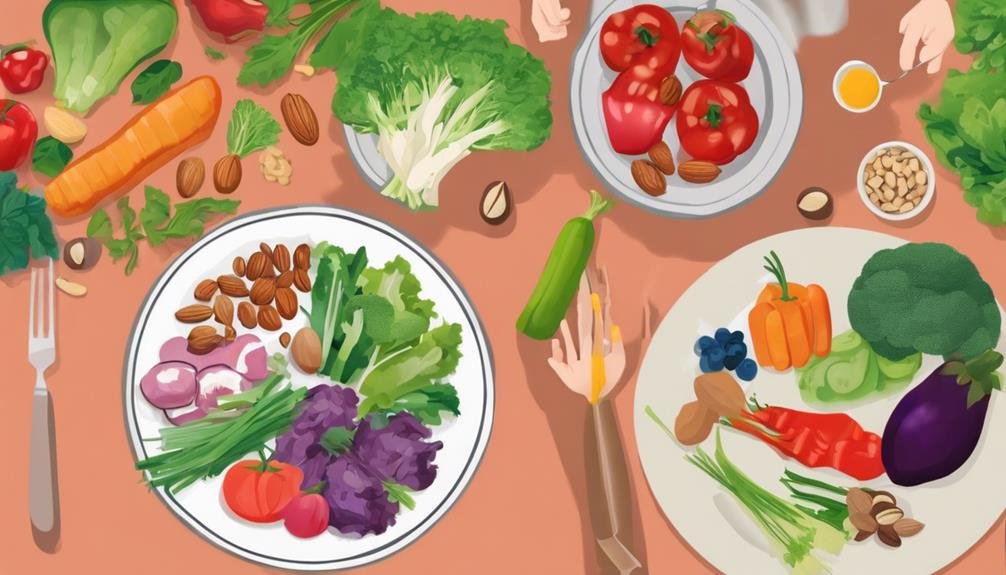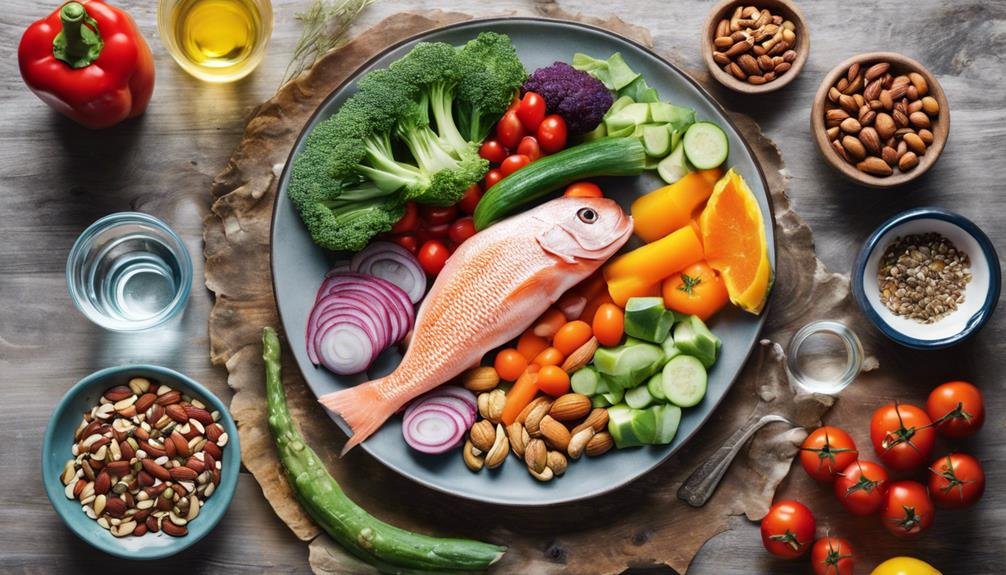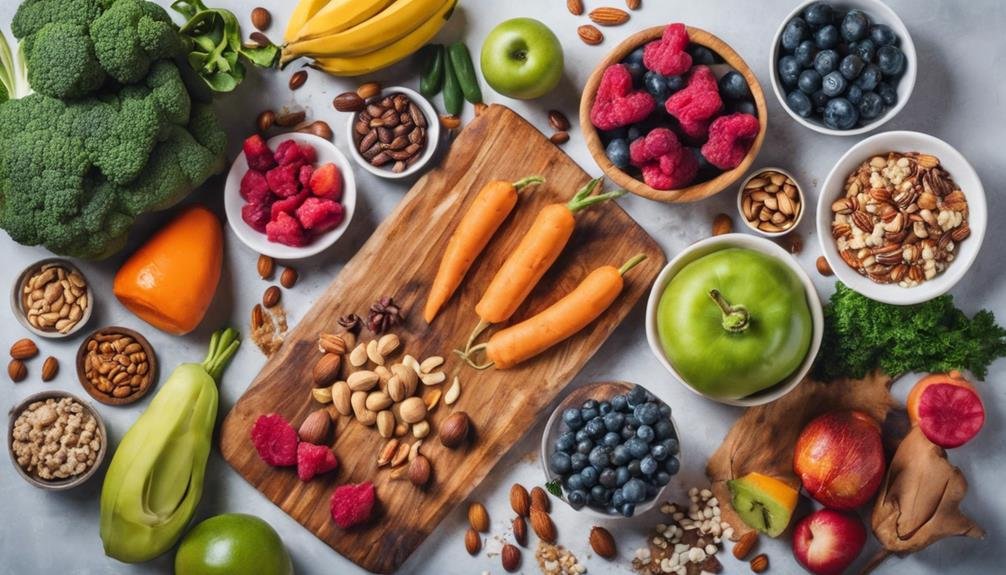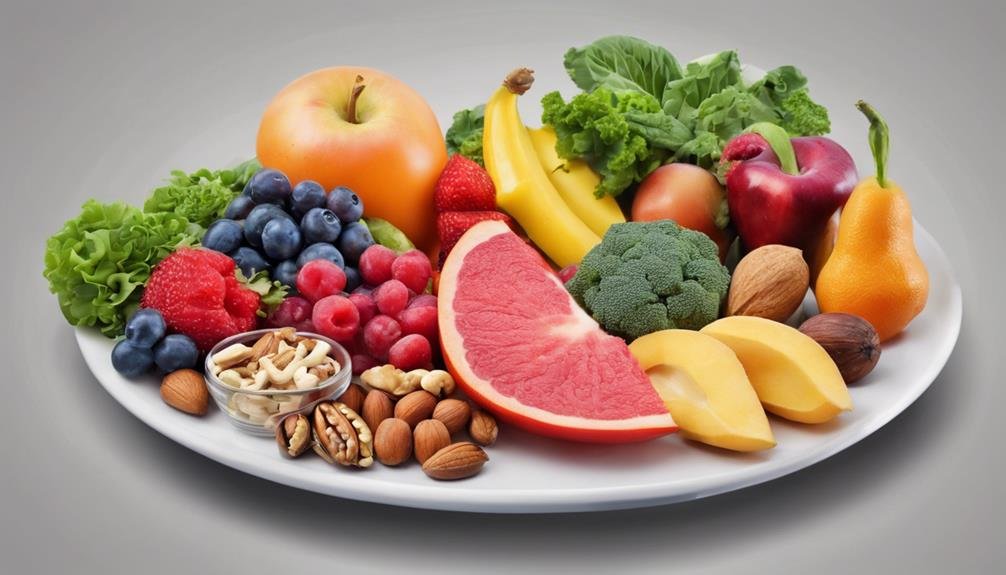When considering cancer prevention, have you ever thought about the potential benefits of the Paleo diet? Imagine a dietary approach that not only nourishes your body but also creates an internal environment less favorable for cancer cell growth. The Paleo diet's focus on ancient eating patterns may hold the key to reducing inflammation, improving insulin sensitivity, and combating oxidative stress, thereby offering a unique perspective on cancer prevention. As you explore the relationship between diet and disease, could the Paleo diet be a promising tool in your cancer prevention toolbox?
Evolutionary Basis of Paleo Diet
The evolutionary basis of the Paleo diet lies in the idea that our bodies are genetically adapted to the types of foods our ancestors consumed during the Paleolithic era.
This diet emphasizes whole foods such as lean meats, fish, fruits, vegetables, nuts, and seeds while excluding processed foods, grains, dairy, and sugar.
Advocates of the Paleo diet argue that our modern diet, high in refined sugars and processed foods, is a significant departure from what our bodies have evolved to metabolize efficiently.
Impact on Inflammation Levels
Eating a Paleo diet has been linked to potential reductions in inflammation levels within the body. Inflammation is a natural immune response, but when it becomes chronic, it can contribute to the development of various diseases, including cancer. The Paleo diet emphasizes whole foods like fruits, vegetables, lean meats, nuts, and seeds while excluding processed foods, grains, dairy, and sugars. These whole foods are rich in anti-inflammatory properties such as antioxidants, omega-3 fatty acids, and phytonutrients.
Research suggests that following a Paleo diet can help lower levels of inflammatory markers like C-reactive protein (CRP) and interleukin-6 (IL-6) in the body.
Influence on Insulin Sensitivity

Improving insulin sensitivity is a key aspect of maintaining overall health and reducing the risk of chronic diseases like diabetes. The Paleo diet, rich in whole foods like lean proteins, fruits, vegetables, nuts, and seeds, can positively influence insulin sensitivity. By focusing on whole, unprocessed foods and eliminating refined sugars and grains, the Paleo diet helps stabilize blood sugar levels and reduce insulin resistance.
Research suggests that the Paleo diet's emphasis on low-glycemic index foods can lead to improved insulin sensitivity. This means that your body can more effectively regulate blood sugar levels, reducing the risk of developing insulin resistance and type 2 diabetes.
Role in Reducing Oxidative Stress
With a wealth of antioxidants and anti-inflammatory properties, the Paleo diet plays a crucial role in reducing oxidative stress within your body. Oxidative stress occurs when there's an imbalance between free radicals and antioxidants in your system, leading to damage to cells and potentially contributing to various diseases, including cancer. By following the Paleo diet, you can help combat oxidative stress through the following ways:
- Increased Intake of Antioxidant-Rich Foods: Foods such as fruits, vegetables, nuts, and seeds are staples of the Paleo diet and are packed with antioxidants like vitamins C and E, beta-carotene, and selenium, which help neutralize free radicals.
- Anti-Inflammatory Properties: The Paleo diet emphasizes whole foods that have anti-inflammatory effects, reducing inflammation in the body that can contribute to oxidative stress.
- Elimination of Processed Foods: By cutting out processed foods and refined sugars, the Paleo diet reduces the intake of pro-inflammatory substances that can exacerbate oxidative stress and damage cells.
Connection to Healthy Gut Microbiome
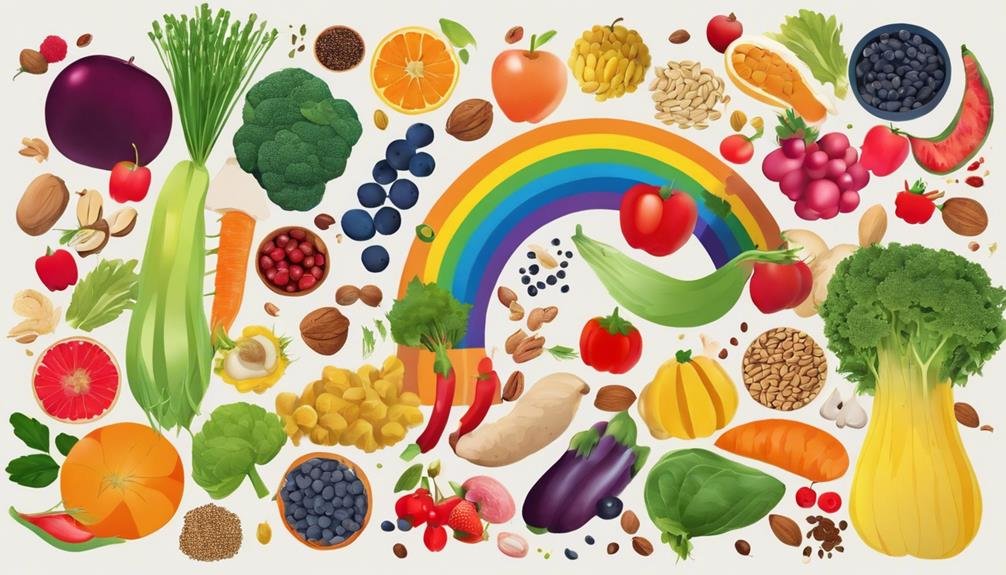
Amidst the intricate web of health benefits attributed to the Paleo diet, its profound impact on fostering a healthy gut microbiome stands as a cornerstone of its nutritional prowess.
The Paleo diet, rich in whole foods like vegetables, fruits, lean meats, nuts, and seeds, provides essential nutrients that support the growth of beneficial bacteria in the gut. This, in turn, helps maintain a balanced microbiome, crucial for overall health and disease prevention.
By consuming foods that are free from processed sugars, artificial additives, and refined grains, the Paleo diet creates an environment in the gut that promotes the growth of beneficial bacteria while reducing harmful pathogens. This balance is essential for proper digestion, nutrient absorption, immune function, and even mental health.
Research suggests that a healthy gut microbiome can play a significant role in reducing inflammation, strengthening the immune system, and potentially lowering the risk of certain cancers. Therefore, by following a Paleo diet rich in whole, unprocessed foods, you aren't only nourishing your body but also supporting a healthy gut microbiome, which is fundamental for overall well-being.
Effect on Cancer Cell Growth
The impact of the Paleo diet on cancer cell growth is a topic of growing interest within the realm of nutritional science. Research suggests that following a Paleo diet may have a positive effect on inhibiting cancer cell growth. Here's how the Paleo diet may help in this regard:
- Anti-inflammatory Properties: The Paleo diet emphasizes whole foods such as fruits, vegetables, lean meats, nuts, and seeds, which are rich in antioxidants and anti-inflammatory compounds. These components may help reduce inflammation in the body, creating an environment less conducive to cancer cell growth.
- Balanced Insulin Levels: By focusing on low-glycemic whole foods and eliminating processed sugars and refined carbohydrates, the Paleo diet can help stabilize blood sugar levels. This balance may reduce the risk of insulin spikes, which have been linked to increased cancer cell proliferation.
- Optimized Nutrient Intake: The diverse array of nutrients present in a Paleo diet supports overall health and optimal immune function. A well-nourished body is better equipped to combat cancer cells and maintain cellular health.
Benefits for Hormone Balance
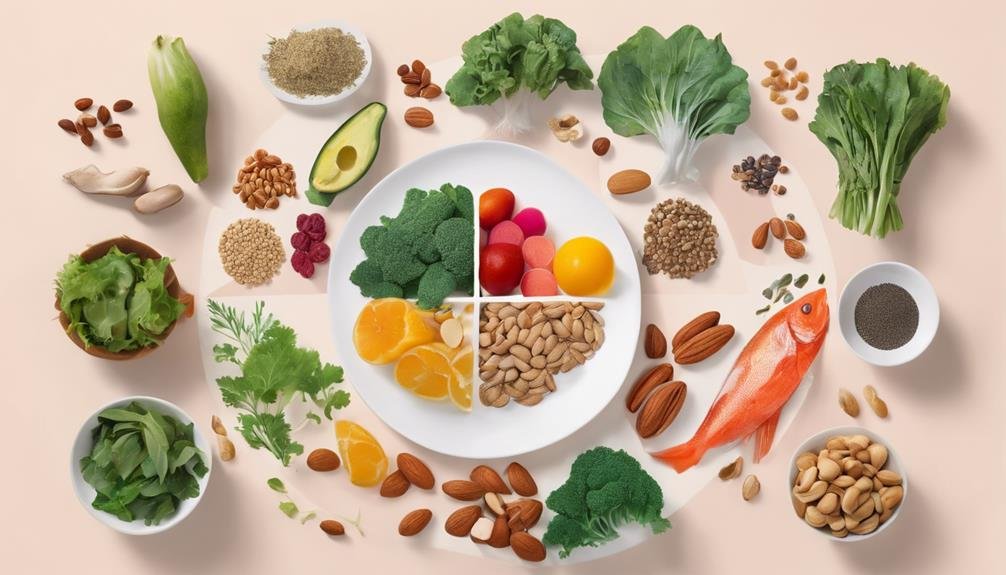
Promoting hormone balance is a crucial aspect of overall health and well-being, and the Paleo diet offers several benefits in this regard. By focusing on whole foods like lean meats, fruits, vegetables, nuts, and seeds, the Paleo diet provides essential nutrients that support hormone production and regulation.
For example, the healthy fats found in foods like avocados and olive oil are important for synthesizing hormones. Additionally, the avoidance of processed foods and sugars in the Paleo diet can help prevent insulin spikes, which can disrupt hormone balance.
Moreover, the Paleo diet emphasizes the consumption of high-quality proteins, which are essential for hormone production. Proteins like grass-fed meats and wild-caught fish provide amino acids necessary for building and repairing tissues, including those involved in hormone synthesis.
Enhancement of Immune Function
Enhancing immune function is a key benefit associated with following the Paleo diet. This dietary approach emphasizes whole foods that are rich in essential nutrients to support your body's defense mechanisms.
Here are three ways the Paleo diet can enhance your immune function:
- Reduced Inflammation: By focusing on whole foods and eliminating processed ones, the Paleo diet can help reduce chronic inflammation in your body. Chronic inflammation is linked to various diseases, including cancer, and by decreasing inflammation, the immune system can function more effectively in fighting off infections and illnesses.
- Gut Health: The Paleo diet promotes the consumption of foods that support a healthy gut microbiome, which plays a crucial role in immune function. A balanced gut microbiome is essential for a strong immune response and overall well-being.
- Nutrient-Dense Foods: The Paleo diet encourages the intake of nutrient-dense foods like fruits, vegetables, lean proteins, and healthy fats. These foods provide essential vitamins and minerals that are vital for maintaining a robust immune system and protecting against diseases. By nourishing your body with these nutrients, you can enhance your immune function and support your overall health.
Potential Anti-Angiogenic Properties
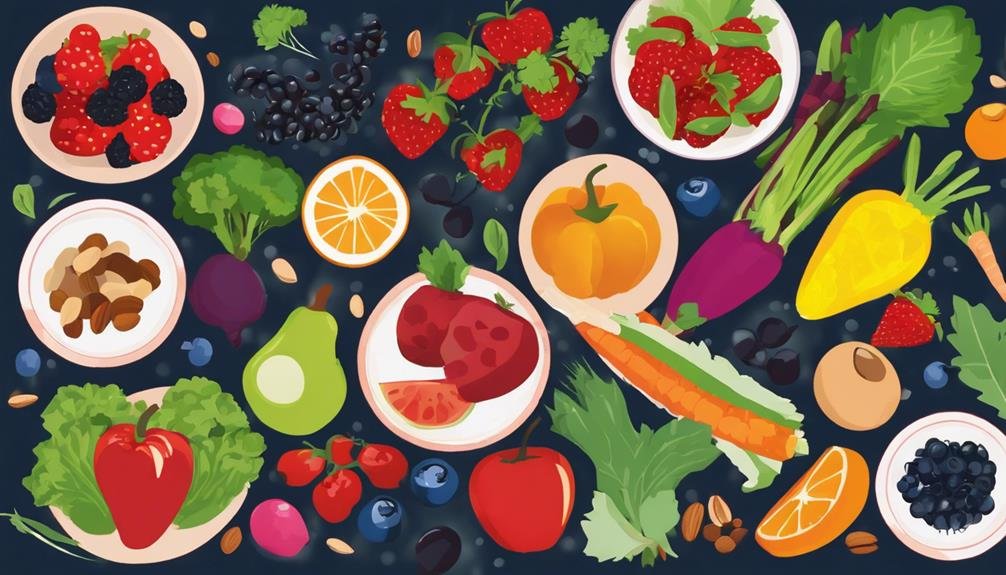
With its emphasis on whole foods and nutrient-rich sources, the Paleo diet presents intriguing potential in the realm of anti-angiogenic properties. Angiogenesis is the process through which new blood vessels form, crucial for tumor growth and metastasis.
Certain foods in the Paleo diet, like fruits, vegetables, nuts, and seeds, contain natural compounds that possess anti-angiogenic effects. For example, foods rich in antioxidants such as berries and leafy greens can inhibit the signaling pathways involved in angiogenesis, thereby potentially limiting the blood supply to tumors.
Moreover, the Paleo diet's avoidance of processed foods and added sugars helps maintain stable blood sugar levels, reducing the production of insulin-like growth factor (IGF-1), a hormone linked to angiogenesis.
Impact on Tumor Suppression Genes
A key aspect of the Paleo diet that warrants attention is its potential impact on tumor suppression genes. Research suggests that adhering to a Paleo diet rich in whole foods may play a role in supporting the expression of genes that help suppress tumor formation. Here are three ways in which the Paleo diet may influence tumor suppression genes:
- Reducing Inflammation: By emphasizing whole foods like fruits, vegetables, and lean proteins, the Paleo diet can help decrease chronic inflammation in the body. Inflammation is linked to the development of cancer, and by reducing this inflammatory response, the diet may support the activation of tumor suppression genes.
- Balancing Hormones: The Paleo diet encourages the consumption of hormone-balancing foods such as healthy fats and proteins. This balance can positively influence hormone levels, potentially impacting the expression of tumor suppression genes that regulate hormone-related cancers.
- Promoting Antioxidant Intake: Antioxidants found in abundance in Paleo-friendly foods like berries and nuts can help combat oxidative stress and protect cells from damage. This protective effect may contribute to the activation of tumor suppression genes, aiding in cancer prevention.
Link to Reduced Risk of Certain Cancers
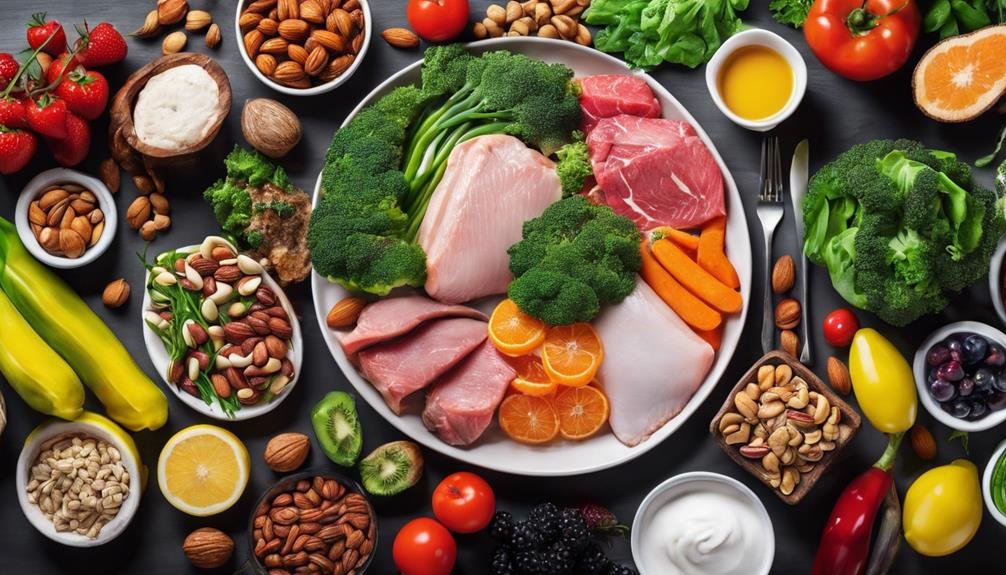
The Paleo diet showcases a compelling association with a decreased risk of certain cancers, backed by emerging research indicating its potential as a preventive measure. Studies suggest that the high intake of fruits and vegetables in the Paleo diet provides a rich source of antioxidants that help combat oxidative stress and inflammation, both of which are linked to cancer development. Additionally, this diet emphasizes lean proteins, healthy fats, and eliminates processed foods and sugars, which may contribute to a healthier body weight and reduced inflammation, further reducing cancer risk.
Research has shown that following a Paleo diet may be particularly beneficial in reducing the risk of colorectal cancer, breast cancer, and prostate cancer. The emphasis on whole, nutrient-dense foods in the Paleo diet supports overall health and may play a vital role in preventing these specific types of cancer.
Practical Tips for Implementing Paleo
Implementing the Paleo diet into your lifestyle can be a rewarding journey towards better health and potentially lower cancer risk. Transitioning to a Paleo diet may seem challenging at first, but with the right approach, you can successfully incorporate this way of eating into your daily routine. Here are some practical tips to help you get started:
- Gradual Changes: Start by gradually eliminating processed foods, sugars, and grains from your diet. Replace them with whole foods such as lean meats, fish, fruits, vegetables, nuts, and seeds.
- Meal Planning: Plan your meals ahead of time to ensure you have Paleo-friendly options readily available. This can help you avoid temptations and make healthier choices throughout the week.
- Seek Support: Join online communities or find a friend who follows the Paleo diet to share recipes, tips, and motivation. Having a support system can make the transition easier and more enjoyable.
Frequently Asked Questions
Can the Paleo Diet Help Prevent All Types of Cancer?
Yes, the Paleo diet may offer some cancer prevention benefits due to its focus on whole foods, lean proteins, and fruits and vegetables. Research suggests that this diet can help reduce inflammation and oxidative stress, which are factors that can contribute to cancer development.
However, it's important to remember that no single diet can guarantee protection against all types of cancer. Incorporating a varied, balanced diet alongside other healthy lifestyle choices is key.
Is the Paleo Diet Suitable for Individuals With Autoimmune Diseases?
If you have autoimmune diseases, the Paleo diet might be beneficial. By eliminating processed foods and focusing on whole, nutrient-dense options, it may help reduce inflammation and support immune function. However, individual responses can vary, so it's crucial to consult with a healthcare provider or a registered dietitian to ensure the diet aligns with your specific health needs. A personalized approach can help tailor the diet to support your overall well-being.
Does the Paleo Diet Have Any Negative Effects on Cholesterol Levels?
Eating a well-balanced Paleo diet may actually have positive effects on your cholesterol levels. By focusing on whole foods like lean proteins, fruits, vegetables, and healthy fats, you can improve your overall heart health and lower bad cholesterol levels. However, it's essential to monitor your individual response and consult with a healthcare provider to ensure the diet is meeting your specific needs and goals.
Are There Specific Foods to Avoid While Following the Paleo Diet?
When following the paleo diet, it's essential to avoid processed foods like sugary snacks, refined grains, and high-sugar beverages. These items can lead to inflammation and disrupt the balance of nutrients in your body. Opt instead for whole, unprocessed foods like lean meats, fish, fruits, vegetables, nuts, and seeds. By making these choices, you can support your overall health and well-being while following the paleo diet effectively.
Can the Paleo Diet Be Customized for Different Dietary Restrictions or Preferences?
Yes, the Paleo diet can be customized to accommodate various dietary restrictions or preferences. You can adjust the food choices within the Paleo framework to suit your needs while still following the basic principles of the diet. By making smart substitutions and being mindful of your specific requirements, you can personalize your Paleo journey to align with your health goals and individual preferences.
Conclusion
In conclusion, the Paleo diet offers a promising approach to cancer prevention by addressing inflammation levels, insulin sensitivity, oxidative stress, gut microbiome health, and potential anti-angiogenic properties. Transitioning to a Paleo diet may help promote overall health and potentially reduce the risk of cancer development. By incorporating whole foods from the Paleolithic era into your diet, you can create an environment less conducive to tumor growth and support your body's natural defenses against cancer.
